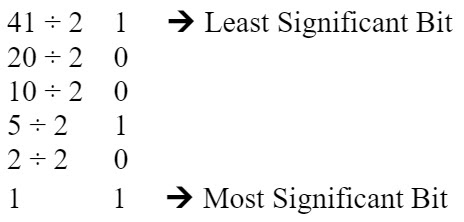There are many techniques that are used to convert numbers from one base to another. In this article, you will learn the conversion of decimal to binary with the help of examples. Here, the following conversion of decimal to binary is explained.
Decimal to Binary Number System
To convert the numbers from decimal to binary, proceed with the steps given below:
◆ Step 1 − Divide the given decimal number by “2” to provide the result and the remainder.
◆ Step 2 − If the given decimal number is even, then the result will be whole, and it provides the remainder with “0”.
◆ Step 3 − If the given decimal number is odd, the result is not divided correctly and provides the remainder with “1”.
◆ Step 4 − By placing all the remainders in order in such a way, the Least Significant Bit (LSB) at the top and the Most Significant Bit (MSB) at the bottom, the required binary number obtained.
Examples -
Example 1 -
Calculate the Binary equivalent of the Decimal number (41)₁₀
answer = (101001)₂
So, (41)₁₀ = (101001)₂
Example 2 -
Calculate the Binary equivalent of the Decimal number (27.15)₁₀
First: We will take just integer number (27)₁₀
answer = (0.0010011)₂
So, (0.15)₁₀ = (0.0010011)₂
So, The final answer of (27.15)₁₀ = (11011.0.0010011)₂
At the end of this article We will use the "Logic Kit" app to show you an example of decimal to binary conversion,
So you can Download "Logic Kit" app on App Store to have help with Number System conversion and all the topics of number system and Boolean algebra,
Click here to download the app.
Tags:
Number Systems






